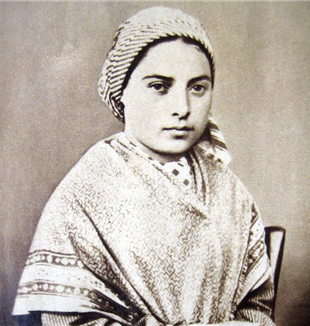
The Grotto of Hope
A book review of April’s Book of the Month: The Song of Bernadette by Franz Werfel. Originally published in the April issue of Tracce.“Reciting the rosary is a kind of heavenly manual work; an invisible sewing or knitting or embroidering, done quickly through the fifty Hail Marys on a crown of little pearls.” Bernadette Soubirous is in the presence of Mary. There has sprung up in her “a spring of clear sympathy, of an ancient covenant…the awareness of a moving connection.” And then, the young girl makes the easiest and most immediate gesture that comes to her mind: she puts her hand quickly into the bag that she always carries with her and pulls out the rosary. “This is certainly a sure means to detain the Lady. And nothing is more important.”
In the seventh chapter of the novel The Song of Bernadette, the Czech writer Franz Werfel recounts the first encounter between Mary and the little French mountain girl at the grotto of Massabielle, a short distance from Lourdes. “I dared sing the song of Bernadette, I who am not Catholic but Jewish,” we read in the introduction to the first edition of the book, in 1941. The year before, he was in France, where he risked being trapped by the Nazi invasion. He fled together with a multitude of “creatures dragged along in that strange migration of peoples,” finding refuge providentially in Lourdes, where he would stay with his wife for seven weeks. In the small town of the Pyrenees, the Jewish writer became aware of the story of Bernadette and of the “marvelous healings” that occurred in that lost back country of Europe. “One day,” he recalls, “disturbed as I was, I made a vow. If I came out of that desperate situation…I would, before any other work, sing the song of Bernadette as best as I could.”
This novel is therefore an act of thanksgiving for a gift that was freely given. The appreciative narration of events whose truth “is attested, in faithful testimony, by friends, by enemies, and by dispassionate observers.” The report of the “moving connection” between the Mother of Jesus and an illiterate young girl. The story of the preference that “nothing be lost,” that everything be saved “in any circumstance of life,” as Father Giussani explained: “The response to this election is to pray as much as we are able. Our response is a prayer, not a particular capacity; it is simply the movement of prayer…The Christian people, for centuries, has been blessed and confirmed in its stretching out toward salvation, I think, especially by one thing: the Holy Rosary. The Rosary is like a synthesis of everything that the Christian people are capable of thinking and saying about Christ.” This is the song of Bernadette. And also of us.